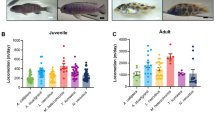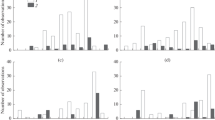Abstract
Goldfish (Carassius auratus) and bluegill sunfish (Lepomis macrochirus) were placed in aquaria where their locomotor activity was monitored by photocells, and tested at various acclimation temperatures over a range encompassing their final thermal preferenda. Activity was pooled over 24-hour periods to eliminate any circadian rhythm effects. Both species exhibited an ‘activity well’ of reduced locomotor activity in the region of the final preferendum. Goldfish, tested either singly or in groups of 2–5 individuals, exhibited a social-interaction effect which became more pronounced at higher temperatures. These results are discussed in relation to a thermokinetic interpretation of thermo-regulatory behavior in fishes, and to the correspondence between thermal preferenda and thermal optima.
Similar content being viewed by others
References
Bartholomew, G. A. 1977. Body temperature and energy metabolism, pp. 364–449 in M. S. Gordon, Animal Physiology: Principles and Adaptations (MacMillan, New York).
Crawshaw, L. I. 1977. Physiological and behavioral reactions of fishes to temperature change. J. Fish. Res. Board Can. 34: 730–734.
Ellgaard, E. G., Bloom, K. S., Malizia, A. A. Jr. & Gunning, G. E. 1975 The locomotor activity of fish: an anology to the kinetics of an opposed first-order chemical reaction. Trans. Am. Fish. Soc. 104: 752–754.
Fraenkel, G. S. & Gunn, D. L. 1961. The Orientation of Animals. (Dover, New York).
Fry, F. E. J. 1947. Effects of the environment on animal activity. Univ. Toronto Stud. Biol. Ser. 55, Publ Ont. Fish. Res. Lab. 68: 1–62.
Fry, F. E. J. 1964. Animals in aquatic environments: fishes, pp. 715–728 in: D. B. Dill, E. F. Adolph & G. C. Wilber (eds.), Handbook of Physiology (Am. Physiol. Soc., Washington, D.C.).
Peterson, R. H. & Anderson, J. M. 1969. Influence of temperature change on spontaneous locomotor activity and oxygen consumption of Atlantic salmon, Salmo salar, acclimated to two temperatures. J. Fish. Res. Board Can. 26: 93–109.
Power, M. E. & Todd, J. H. 1976. Effects of increasing temperature on social behaviour in territorial groups of pumpkinseed sunfish, Lepomis gibbosus. Environ. Pollut. 10: 217–223.
Reynolds, W. W. 1977. Temperature as a proximate factor in orientation behavior. J. Fish. Res. Board Can. 34: 734–739.
Reynolds, W. W. 1978. The final thermal preferendum of fishes: shuttling behavior and acclimation overshoot. Hydrobiologia 57: 123–124.
Reynolds, W. W. & Casterlin, M. E. 1976a. Locomotor activity rhythms in the bluegill sunfish, Lepomis macrochirus. Am. Midl. Nat. 96: 221–225.
Reynolds, W. W. & Casterlin, M. E. 1976b. Thermal preferenda and behavioral thermoregulation in three centrarchid fishes, pp. 185–190 in G. W. Esch & R. W. McFarlane (eds.), Thermal Ecology II (Natl. Tech. Info. Serv., Springfield, Va.).
Reynolds, W. W., Casterlin, M. E., Matthey, J. K., Millington, S. T. & Ostrowski, A. C. 1978. Diel patterns of preferred temperature and locomotor activity in the goldfish Carassius auratus. Comp. Biochem. Physiol. 59A: 225–227.
Reynolds, W. W. & Thomson, D. A. 1974. Responses of young Gulf grunion, Leuresthes sardina, to gradients of temperature, light, turbulence and oxygen. Copeia 1974: 747–758.
Richards, F. P., Reynolds, W. W., McCauley, R. W., Crawshaw, L. I., Coutant, C. C. & Gift, J. J. 1977. Temperature preference studies in environmental impact assessments: an overview with procedural recommendations. J. Fish. Res. Board Can. 34: 728–761.
Author information
Authors and Affiliations
Rights and permissions
About this article
Cite this article
Reynolds, W.W., Casterlin, M.E. Effect of temperature on locomotor activity in the goldfish (Carassius auratus) and the bluegill (Lepomis macrochirus): Presence of an ‘activity well’ in the region of the final preferendum. Hydrobiologia 65, 3–5 (1979). https://doi.org/10.1007/BF00032711
Received:
Published:
Issue Date:
DOI: https://doi.org/10.1007/BF00032711




